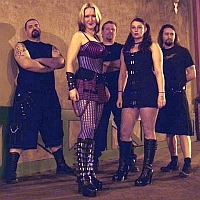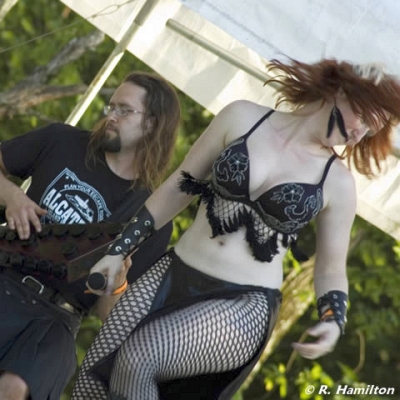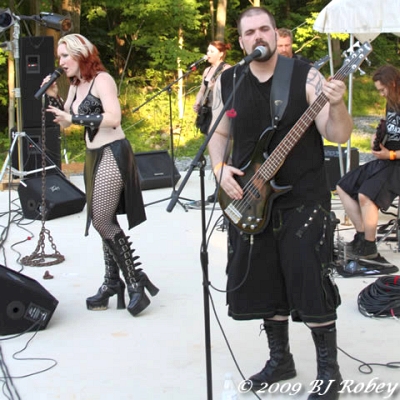Cassandra Syndrome Interview
Sonic Cathedral’s Doctor T talks to the members of Cassandra Syndrome

Doctor T: Given your backgrounds, one could suggest that your message is not a typical one. How did that perspective come about?

Irene: My intense interest in and love of the environment was actually instilled prior to joining the military. I was fortunate enough to grow up in a family that loved to camp, hike and spend time outside. I also adopted Paganism as a belief system when I was a teenager. That particular set of beliefs holds the environment in highest regard. So those attitudes were present from an early age.
My time in the Marines played a huge role in my point of view on the current conflict. I think a lot of people view the military as this large, faceless, disposable entity. To me, it’s anything but. When we send soldiers, Marines, sailors and airmen overseas and into harm’s way, those are my friends, my brothers, taking the heat. I know them, worked with them, love them. They are NOT disposable. The U.S. Military is definitely a volunteer force, but we don’t volunteer because we have a death wish. We volunteer because we love this country enough that we want to help. There’s an implicit trust that goes with our promise to serve—that this country will not choose to spend our lives frivolously. That we will only be called upon to make the ultimate sacrifice when it is necessary, when there is no other way. This ‘war of choice’ violated that trust, and I am enraged on behalf of my brothers and sisters in the Armed Services.
One thing that people also forget is that those in the military really can’t speak for themselves. To speak out against our own government constitutes treason in some commands. Someone must speak for the men and women dying in this international disaster. Music is the best form of communication I know—a song can touch far more deeply than the best rhetoric. So I do what I can with the skills I have. I only hope that it’s enough. I am very lucky in that my bandmates share my point of view on the planet and on this war.

Jay: I think all of the music that ever moved me since I was little has been political or social in nature, not love songs. "Imagine" by Lennon, "War" by Edwin Starr, "War Pigs" by Sabbath, "One" by Metallica, "B.Y.O.B" by SOAD, I could go on and on, but this is the music that always inspired me, music that made me think.
Joe: My perspective of the world changed greatly after my time in the service. The big kicker for my perspective change to that of a puzzled outsider was just reading other countries’ news sources. Our media is vastly different and paints a very different picture of events both at home and abroad. It saddened me so much to see that so many other countries hated us. We have the potential to be the best country in the world, but this will not come about by having the biggest bombs and flexing our muscles. It will come by helping the ‘have-nots’ get what they need.
Quite a few songs have moved me over the years as well. "Solider Side" by SOAD, "Contractor" by Lamb of God, and as Jay said, "Imagine" was very moving as well.
Chris: I spent my childhood outside. I grew up on a small farm and still go back to help out. I always knew where my food came from and how it made its way to my plate. Pagan beliefs just made sense to me as a result. I was a social studies/history major in college and it still amazes me that mankind continues to make the same mistakes over and over again. Musically I've always been into more politically charged music, so the message in CS's music fits me. Metallica and Megadeth were huge influences for me.
Katie: I hold close to my heart the world in which I live, whether it’s the people that walk on it or the ground that they walk upon. I have enormous respect for the environment and try to be mindful of it every day. I cannot express fully the joy it has given me, therefore it is equally difficult to express how deeply hurt I am that many others do not recognize and/or respect the brilliance that surrounds them every day.

Doctor T: I have to ask you about the drum like instrument used in your music. Could you describe it and talk about how that came to be a part of the CS sound?
Jay: It's called a Zen drum and each instrument is custom-made when you order it. It has 25 MIDI triggers which are then assigned to different parts of the kit via a Roland drum module. You essentially wear it like a guitar, except I strike the pads with my hands to make specific drum sounds. Zen drum has a website at http://www.zendrum.com that I highly recommend checking out. To make a long story short, when Irene and I were winding down on the folk-project, we started talking about where we wanted to go from there, and the suggestion was made for a more aggressive, heavy sound. In that folk-project, I was a hand-drummer, not a kit drummer, but we recently shared the stage with another performer who used a Zen for their drums and I figured that by using a Zen drum, I could adapt my hand drum technique to a kit sound.
Doctor T: Did you consciously decide to make this band one about social consciousness or did that evolve over a period of time?
Irene: My songwriting has always tended toward either social commentary or spirituality. I think we knew, going in, that our material was going to be largely socio-political in nature. It definitely influenced our choice of band name. ‘Cassandra Syndrome’ seemed quite apropos for a band desperately trying to pass on an unpopular warning.
Our lyrical themes also influenced the style of music we now create. Jay and I came to Cassandra Syndrome from a folk project. As the nature of my lyrics darkened and grew more inflammatory, we realized that folk was no longer strong enough to carry our message.

Doctor T: You mentioned in our previous communications that you were a Marine and that several other members of the group were military. When did your musical interests develop, before or after those experiences?
Irene: I was pretty much raised on stage and have been part of performing choirs and musical groups of varying sorts since I was about 7 years old. Even when I was in the Marines, I would have these weird evenings where I’d have to find a quiet spot to sit by myself and just sing. That need to use my voice for music is very deeply ingrained.
Jay: During for me. I actually started playing hand drums while I was in the Air Force, in Okinawa, Japan. A bunch of us would head out to the beaches on weekends, and we’d drag hand drums and jam. We came back to the states and next thing you know, I’m playing hand drums in a folk band.
Joe: I'm going to take this opportunity to be a bit shallow I suppose. Originally, I picked up the guitar back as a freshman in high school in order to impress girls. I mean seriously... How many guys in high school played guitar and didn't use it to impress girls? I played bass a bit for a screaming metal band that really didn't require any solid talent to play. We sucked, I spent the majority of the time just thrashing around on stage. When I joined the military I stopped playing. It wasn't until after I had reunited with Irene after our military careers that I was brutally ambushed and informed I would be learning the bass again. Since then, I've managed to actually develop my skills a little further since this band is definitely more technical than anything I’d been involved with before.
Chris: No military service for me, but I can say I've been addicted to playing guitar since I was 11. My musical interests mirrored what I could play on guitar. The better I got, the more complicated music I listened to.
Katie: Like Chris, I’m not former military either. I grew up around musicians and always admired them immensely. The musical interest has always been there but the vehicle for me to develop those interests into something substantial has only recently become available. I have had guitars and played with them on and off since I started college, but I have only really started to learn over the past year (thanks Chris).

Doctor T: For Cassandra Syndrome, the message is all- important. Could you describe some of the principle themes that drive your musical concepts?
Irene: The environment and what we’re doing to it is one major theme. As an ardent environmentalist, I’m horrified by the careless, dangerous way we’re using our natural resources.
The chipping away of our civil liberties is another theme. American people have been coerced and bludgeoned into a state of fear and, as a whole, are willing to give up anything for an illusory façade of safety. The previous administration did a great job of stripping away our rights. Habeas corpus, anyone?
The impact of our country’s behavior on the rest of the world is another concept we address. Our interference and high-handedness have pretty much guaranteed us at least another two or three generations of people who (very rightly) hate our government. We’ll be reaping the rewards of our actions for decades to come.
We also address prejudice. Humans have an awful tendency to hate and fear anything or anyone they don’t understand. If we don’t get over that and become truly cross-cultural, our growth ends here. The election of President Obama gave me some hope, but we still have a LONG way to go.
The non-visible repercussions of this country’s military actions on its own citizens also get some attention. Right now, 1 in 4 veterans are coming home with some form of Post Traumatic Stress Disorder. The resources we have in place to help these poor service members are underwhelming, to say the least. The domino effect of so many veterans with PTSD is huge—families imploding, veterans left untreated and therefore dependent on an already-taxed system just to survive, veterans who are no longer equipped to deal with a combat environment returned to the front for yet more torture... This is the legacy of our ‘war of choice:’ crippling physical wounds, yes, but crippling mental ones as well.
Spirituality is the other major theme. It shows up in songs like ‘Skadi’s Touch’ and ‘Wild.’ I wouldn’t necessarily call us a ‘Pagan Band,’ but it would be hard to miss the fact that everyone in the band is Pagan.

Joe: I would like to add something here, if I may. The main message I want to get across is that everything in this world can be heaven if we allow it. Mind you, horrible things happen around the world on a daily basis and it will continue until we can educate people and make them realize that regardless of our ethnic background, religious preference or political affiliation, we are ALL human beings. We share the same biological make up and really all look the same on the inside. Once this basic idea can be shared world-wide, we can begin to make progress. Labeling those you do not like as immoral, unpatriotic or any other negative connotation only throws gasoline on the candle of debate and can quickly escalate the issue into something where people kill each other over their differences.
Doctor T: Musically, how would you describe your work, would you call it typical metal or do you have some other directions in mind?
Irene: We like to think we’re a good blend of solid, traditional, axe-heavy American metal (Sabbath, Metallica, etc) with the unusual twist of an operatic female vocalist. We tend to get hammered a lot for having an operatic vocalist but no synths. Quite frankly, we’re not really going for a symphonic sound. So yeah, metal with a twist.
Jay: I’d say Irene’s description is pretty accurate. I don’t think we’re specifically shooting for particular sound at all. Rather, I see us as each bring the elements about our particular instruments that we enjoy, and then knitting that together. That said, the latest material we’re already developing for the second album certainly has a more epic feel to it, I think.
Joe: Irene nailed it to the wall, in my opinion. Each one of us comes from a different musical background. I listen to everything from Gordon Lightfoot to Lamb of God. While I have been listening to the heavier stuff more often in the past six years, I find my bass work definitely doesn't come from the standard metal template. We all add the piece of us that we enjoy the most until you get the hulking, undying monstrosity that is now standing before you.

Chris: I'd say we're typical metal, with some not-so-typical influences. Categorizing any music these days is tough. It seems that as time goes on different styles leak into everything.
Katie: I remember listening to this band before I joined and thinking that I had never heard anything like it. Sure, the pieces that make up our music that can be traced back to one musical style or another, but each person in the band has many different influences. I feel that we work together to make all of those styles blend. The fact that we are all so different is what makes us so unique.
Doctor T: Giving yourselves the name Cassandra is almost like setting yourselves up for a fall given the failure in message achieved by the original user of that name. Do people tend to “get” your message or do you think they’re just there for the music?
Irene: I think our hope is that people come for the music and stay long enough to get the message. We know it’s going to blow right by a lot of people, but if just one person starts to think, to ask questions, to take actions, based on hearing one of our songs, then it was worth it.
Giving ourselves the name Cassandra Syndrome is also a bit of self-deprecating fun. We’re well aware that, taken together, our material has quite an alarmist, perhaps even hysterical, tone. I often joke that we named ourselves for this particular mental disorder because I happen to have it.
Jay: I think the name was my fault. So, if it does set us up for an epic fall, I’d like to apologize in advance to my bandmates.
Joe: I think the message is sinisterly accurate. We have lots to say in our music and the concepts we project are not difficult ones to understand, but they are demons that have haunted our history for quite some time now. "Those who cannot remember the past are doomed to repeat it." This country seems to have that problem. Look back at WWII, the Korean War, Vietnam...Many will speak of justified War. While this may be true to some degree, we won’t be the humans we need to be until we realize that we should allow ourselves to live in peace.
I talk to people after our shows quite often and most of them just say that they liked it and then ask questions about the riffs and things like that. However, there have been a few over the course of our career as a band that ask me directly about some of the lyrics or what was meant during certain phrases. Even if they don't hear it directly, one day they will be singing along in their car and it will dawn on them. Everything that I do with this band is the hope of finding those lone people who will "get it" and strive to make an actual difference.
Chris: I've noticed that the people that don't get the music generally still appreciate the fact that we're a solid band. The people that do get it REALLY get it. There seems to be some people we really click with.
Doctor T: What is the writing process for song development? Do you have a theme in mind or do you start with the music and then develop the theme?
Irene: Our music generally begins from two start points. I write lyrics as poetry first, so we have a guideline from there in terms of how a song should sound. Chris usually comes up with the riffs to fit the theme of the song. We begin with those pieces and then hammer away at them as a group. Everyone is really awesome about both giving and receiving constructive criticism. The end result, the finished song, is never identical to the pieces that went into it. By the time we’re through, it’s an amalgamation of the best creative input from each band member.

Doctor T: Your music is, by your own admission, politically and socially based. However, as practicing pagans, how has that perspective had an impact on your music and your message?
Irene: I sometimes joke that my Paganism grew out of an unusually virulent form of environmentalism. If nothing else, Paganism influences us to place greater value on life, whether human, plant or animal. Paganism is definitely at the root of songs that are spiritual in nature, of course. Pagans tend to personify the seasonal cycle, so ‘Skadi’s Touch’ is about the transition to winter as personified by Skadi, the Norse winter Goddess.
Doctor T: What musical groups, or musical directions, have influenced the development of the CS sound? And, secondly, are there musical or other influences that have influenced your political and social consciousness?
Irene: We never started out thinking, we want to sound just like “insert band name here.” We all listen to a lot of hard rock, so I’m sure that filters in on some level. As far as expressing our socio-political views, I always admire other groups who are brave enough to do the same, but I never chose to write the way I do. To write lyrics, I have to be moved on a deep level to some emotional extreme. That tends to happen most when I read the news.
Doctor T: The recent elections in this country hinged on change. Do you see that change occurring, and if so, in what areas.
Irene: Change seems to come slowly to this country. The election of President Obama was a step in the right direction. The message of his platform was truly inspiring—the idea that we didn’t have to continue to be the bully on the international playground, that we truly could care for our own, that we could stop being so irresponsible and destructive with the world. The country as a whole chose him because of that idea—that we can change, we can fix this. Thing is, the process of cleaning up decades of disaster (especially the last 8 years, but we have environmental abuses stretching much farther back than the Bush administration), will take a very long time. I have seen some change—granting same-sex partner health benefits to federal employees was a fantastic step in the right direction—but it’s a slow process. There’s a lot of tugging. People fear change and sometimes would rather stick with a corroded, ineffectual system than entertain something new. I do have hope again, though. It’s been a long time since I’ve been hopeful.
Doctor T: In listening to this music, and a lot of the music around the world and in this country as well, it seems that we tend to see a message like yours more in non-American bands than in American bands. Do you agree or disagree and why.
Irene: There is an unfortunate tendency in a country as large and affluent as ours to simply ignore the negative. We turn away from poverty, abuse, intolerance and destruction. We drown the real issues in celebrity gossip and reality television. In order for more people, more musicians, to begin talking about the real issues, we have to be aware of them. In America, one must ~choose~ to pay attention. And one must seek out information from sources other than the ones closest to hand. Our news agencies are bought and paid for. There’s precious little truth in the American media anymore. I tend to get my news from the BBC as a result.
It seems to me that there aren’t that many people in this country willing to go to the trouble of truly paying attention. Many of us simply accept what our media stations tell us and move on. Of the people who are paying attention, an even smaller number are musicians. I think that’s why most American music is about emotions and relationships. We can’t sing about what we can’t see.
That said, there are some American bands out there doing their best to drag larger issues to the table. Disturbed, NIN and the Flobots spring immediately to mind.

Doctor T: Any other thoughts you might like to add for our readers here at Sonic Cathedral. . .
Irene: Although our subject matter is generally serious, I’d hate to leave your readers with the impression that we’re a bunch of miserable doom-sayers. The hope behind our music is that by talking about it, we’ll be able to help the situation. We’re also daffy bastards in person. There’s a lot of banter and laughter at our shows.
Jay: Yeah, only Irene is a miserable doomsayer. The rest of us don’t have a clue what’s going on…
Joe: I have no idea who these people are...They chloroformed me this morning and told me if I didn't play the bass for them they would break my knees...Please...Help me....They keep me in the basement!!!!
Katie: Muhahahahaha!!
Chris: There's stuff going on? I'm just here for the beer...
Doctor T: Someone get that man a beer. . . get me one too while you’re at it, cold, large.
Thanks a lot to Irene, Jay, Joe, Katie and Chris. We look forward to seeing you live in the very near future.
Check out more of Cassandra Syndrome: http://www.cassandrasyndrome.com
